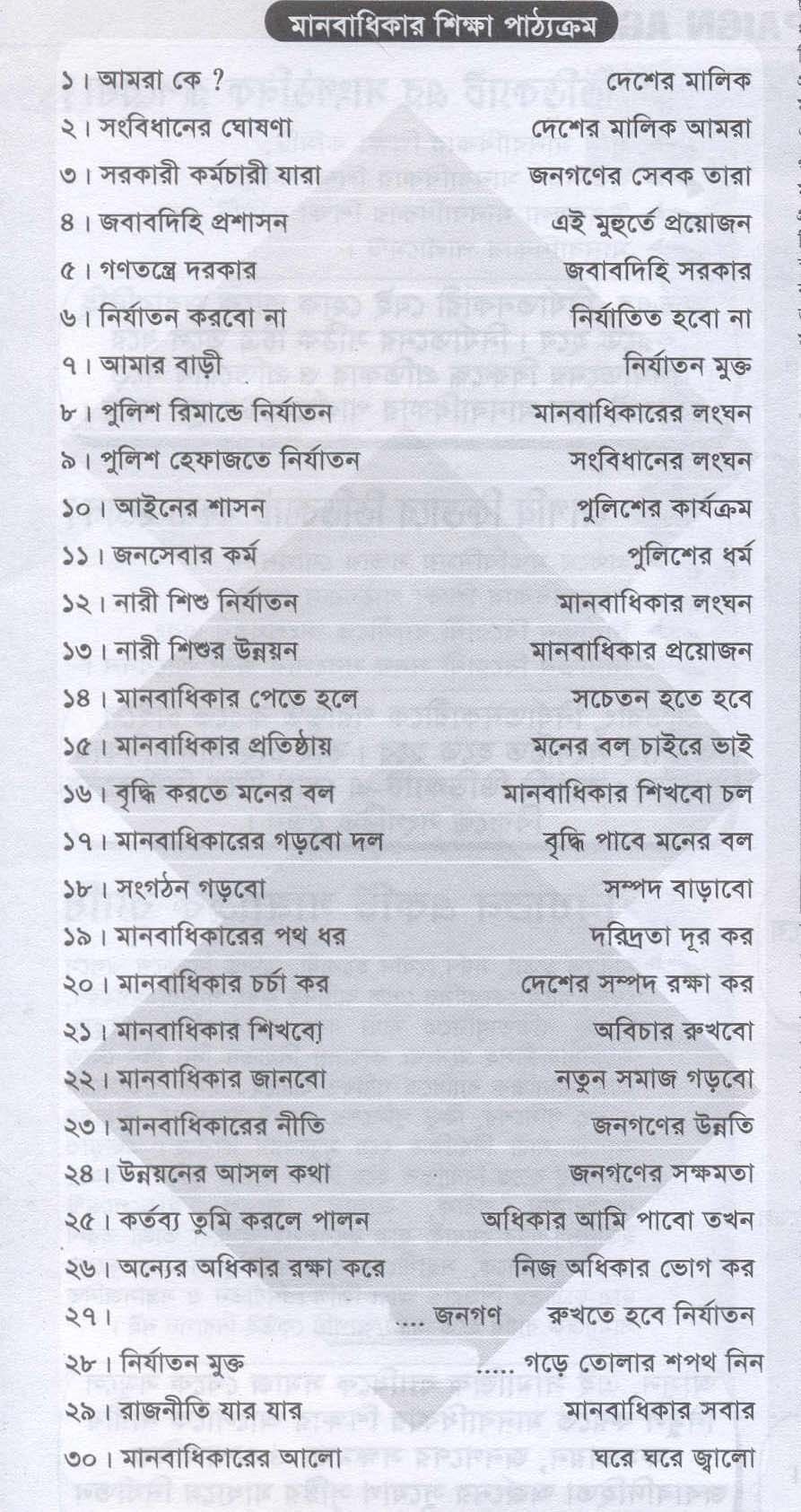
In preparation for a community information session that he will conduct in the near future, JM 2010 Shahanur Islam recently republished a brochure about human rights standards in Bangladesh. As the head of the Bangladesh Institute for Human Rights (BIHR), Shahanur first designed the brochure several months ago, in preparation for a door-to-door campaign to highlight the problem of torture in prisons. The pamphlet empowers ordinary Bangladeshis by informing them—in language easily understood by a layperson—of their rights once they are behind bars. As part of the community information session, Shahanur intends to distribute the brochure to residents of Dhaka who have fallen victim to police abuse.
Shahanur says that his intention in creating and publishing the pamphlet was to remove a “veil of silence” that keeps torture victims from asserting their rights as human beings and citizens of their own country. Understanding that citizen activism is often muffled by illiteracy and a lack of education, the brochure contains short, impactful phrases that ordinary citizens can learn ad share with their neighbours and friends, to help amplify their voices.
Written entirely in Bangla, the brochure includes information on constitutional, legal and religious prohibitions against torture. It also addresses the kinds of acts which constitute torture, and statistics about the frequency with which it occurs in Bangladesh.
Flyer contains
Aim:
- to convey the message of human rights and law at each and every house of the community;
- to cultivate a culture of human rights which will make people dutiful and tolerant to each other through practice.
How will the Information Session Proceed?
- Join the view exchange meeting first
- Read and follow the human rights curriculum
- Participate in the rallies protesting torture
Where is torture prohibited?
- Article 35(5) of the Constitution of the People’s Republic of Bangladesh
- Article 5 of Universal Declaration of Human Rights (UDHR)
- Article 7 of International Covenant on Civil and Political Rights (ICCPR)
- Obligation of Compensation is mentioned in Civil Procedure
- Criminal Procedure Code
- UN Convention Against Torture
- In the religious and holy books
Let us make people aware of the prohibitions on torture mentioned in the constitution, law and religion.
How do we suffer as a result of torture?
- A person is punished physically
- A person loses mental inspiration to work
- Economic life of a person becomes damaged
- A person loses his life
- Torture creates panic and fear in society
- A person’s personality is affected
- A person becomes burden upon his family
- Torture is threat to democracy
- Torture is threat to development
Torture is a Social Disease:
Incidences of torture in Bangladesh have increased alarmingly over the past years. Death, rape, sexual harassment, and blackmail are endemic problems. Though it is the duty of the police to protect citizens against violence, they themselves have allegedly killed many people and destroyed many lives in custody.
Self Realization:
It is essential for awareness of torture and its consequences are more widespread in order for Bangladeshi society to become “torture free”.
Appeal:
Come on! To uproot these diseases from our society lets us empower the women and increase the capabilities of people and create opportunities for every one to make the administrators accountable to us, in order to build up a torture free society.
Let us speak out against torture before we become its victims. Let us generate a movement!
The lesson/slogan:
Who are we: Owners of the state
The Constitution declares that: We are the owners of the state
Public officers are: The servants of the people
Accountable administration: The requirement of the time
Democracy requires: Accountable administration
Neither will I torture: Nor I will be tortured
My home is: Torture free
Torture in police remand is: A violation of Human rights
Torture in police custody is: A violation of the constitution
Rule of laws: Determines the jurisdiction of police
To provide public service: Is the duty of the police
Torture of children and women is: A violation of human rights
For the development and children and women: Human rights are essential
To establish human rights: We should be conscious
To establish human rights: Passion is essential
To gear up our mental strength: Let us learn human rights
Build a group based on human rights: Mental strength will be enhance
Get organised: Get more wealth
Live with human rights: Build new society
Practice human rights: Preserve the resources of the state
To drive human rights: We should be conscious
Learn human rights: To build new society
Core of human rights is: Development of the people
Main theme of the development: Capability of the people
If you do your duty: I will get my rights
Preserve one’s rights, first: Enjoy your own rights then
The people of Bangladesh: Resist torture
Torture free Bangladesh: Promise to build one
Aim should be politics: Main theme is human rights
The lights of human rights: Lit in every house.
to read the original report visit here
